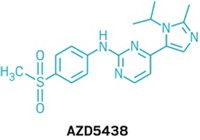Advertisement
Grab your lab coat. Let's get started
Welcome!
Welcome!
Create an account below to get 6 C&EN articles per month, receive newsletters and more - all free.
It seems this is your first time logging in online. Please enter the following information to continue.
As an ACS member you automatically get access to this site. All we need is few more details to create your reading experience.
Not you? Sign in with a different account.
Not you? Sign in with a different account.
ERROR 1
ERROR 1
ERROR 2
ERROR 2
ERROR 2
ERROR 2
ERROR 2
Password and Confirm password must match.
If you have an ACS member number, please enter it here so we can link this account to your membership. (optional)
ERROR 2
ACS values your privacy. By submitting your information, you are gaining access to C&EN and subscribing to our weekly newsletter. We use the information you provide to make your reading experience better, and we will never sell your data to third party members.
Pharmaceuticals
New strategy to prevent blood clots could come with lower bleeding risk
Previously understudied drug target could offer safer, more effective treatments for some cardiovascular diseases
by Michael Torrice
January 9, 2017
| A version of this story appeared in
Volume 95, Issue 2
People with a high risk of suffering from a heart attack or stroke often take drugs that prevent formation of clots in their blood vessels. These drugs have a narrow so-called therapeutic window: Dosages that are high enough to effectively limit harmful clotting can also increase a person’s risk of life-threatening bleeding. A team of researchers at Bristol-Meyers Squibb and the University of Montreal reports a new strategy that could widen that window (Sci. Transl. Med. 2017, DOI: 10.1126/scitranslmed.aaf5294). The enzyme thrombin plays a key role in activating platelet cells to start the clotting process. One of its functions is to turn on protease-activated receptors (PARs) by cutting off a bit of the N-terminus of the proteins. The drug vorapaxar works by turning off one member of that family, PAR1. The BMS-led team decided to investigate the potential of targeting the less studied PAR4. The researchers screened 1.1 million small molecule compounds to find one that blocked the receptor. Chemists optimized the resulting imidazothiadiazole compound to produce BMS986120. This compound was more effective in reducing clotting in cynomolgus monkeys and had a lower bleeding risk than did the approved drug clopidogrel. BMS has started a phase II clinical trial with a related molecule, BMS986141.



Join the conversation
Contact the reporter
Submit a Letter to the Editor for publication
Engage with us on Twitter